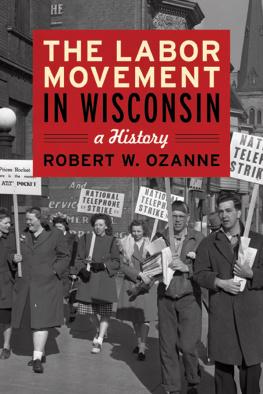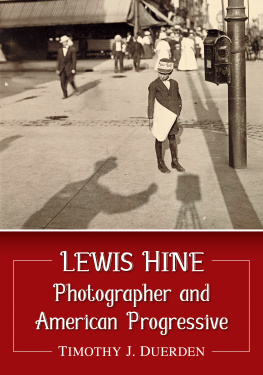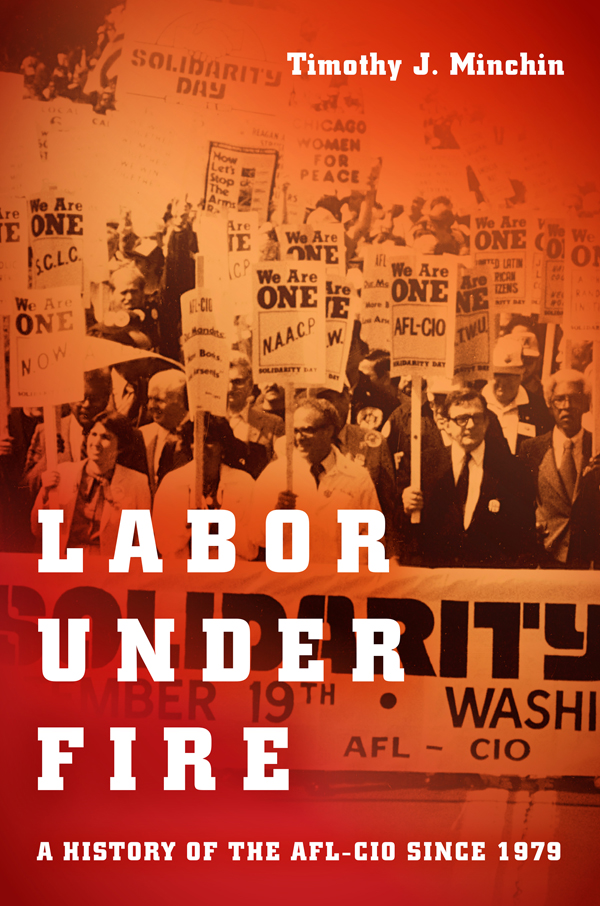Contents
Guide
Pagebreaks of the print version
Labor Under Fire
TIMOTHY J. MINCHIN
Labor Under Fire
A History of the AFL-CIO since 1979
The University of North Carolina Press Chapel Hill
2017 Timothy J. Minchin
All rights reserved.
Set in Arno Pro by Westchester Publishing Services
Manufactured in the United States of America
The University of North Carolina Press has been a member of the Green Press Initiative since 2003.
Library of Congress Cataloging-in-Publication Data
Names: Minchin, Timothy J., author.
Title: Labor under fire : a history of the AFL-CIO since 1979 / Timothy J. Minchin.
Description: Chapel Hill : University of North Carolina Press, [2017] | Includes bibliographical references and index.
Identifiers: LCCN 2016042815 | ISBN 9781469632988 (cloth : alk. paper) | ISBN 9781469632995 (ebook)
Subjects: LCSH : AFL-CIOHistory20th century. | AFL-CIOHistory21st century. | Labor unionsUnited StatesHistory20th century. | Labor unionsUnited StatesHistory21st century.
Classification: LCC HD 8055. A 5 M 56 2017 | DDC 331.880973dc23 LC record available at https://lccn.loc.gov/2016042815
Jacket illustration: Solidarity Daylead group. Courtesy of Special Collections, University of Maryland Libraries.
Chapter 3 was previously published in a different form as Together We Shall Be Heard: Exploring the 1981 Solidarity Day Mass March, Labor: Studies in Working-Class History of the Americas 12, no. 3 (September 2015): 7596. Portions of chapters 9 and 10 were published in Labor is Back?: The AFL-CIO during the Presidency of John J. Sweeney, 19952009, Labor History 54, no. 4 (October 2013): 393420, and A Pivotal Role? The AFL-CIO and the 2008 Presidential Election, Labor History 57, no. 3 (July 2016): 299322. All material used here with permission.
To Anthony John Minchin
Contents
Illustrations
Acknowledgments
This book would not have been possible without the help of friends, colleagues, and institutions in the United States, UK, and Australia. While it is impossible to acknowledge all those who have assisted me, I would especially like to thank the Australian Research Council (ARC), as Labor Under Fire is the main outcome of a three-year discovery grant that the Council awarded me for this project. This book could not have been contemplatedlet alone completedwithout the ARCs generous support. Prior to this, I was assisted by a grant from the U.S. Studies Centre at the University of Sydney, where I was a researcher in residence in July 2012. During this fellowship, I formulated the ideas behind the book and conducted early research. I am especially grateful to Brendon OConnor and Shane White, Sydney-based scholars who encouraged me to pursue the project. I would also like to thank La Trobe University for its consistent support, especially in awarding me a period of research leave during the writing process.
The research for the book was underpinned by a series of lengthy research trips to the United States, particularly Washington, DC. On my travels, a number of former AFL-CIO leaders and staff were enormously helpful. Tom Donahuewho served as AFL-CIO secretary-treasurer and presidentput me in touch with many retirees and was extremely generous with his time. He also shared his personal papers, including original material on the 1995 leadership contest. Special mention should also go to Lane Windham and Joe Uehlein, who helped arrange a number of interviews, especially with staff from the John Sweeney era. In addition, I should thank Mark Anderson and Steve Rosenthal, valuable interviewees who also gave me access to personal written material.
At the AFL-CIO headquarters, Pat Lleras and Angie Forsythe gave me a place to work and helped with interviews, while Arlene Holt Baker, Liz Shuler, John Sweeney, and Richard Trumka were especially generous with their time. Several former leaders of Change to Win, particularly Anna Burger and Andy Stern, also agreed to be interviewed and were very helpful. All of these peopleand many morehelped make my trips to Washington, DC, productive and enjoyable. They ensured that I came away with more interviews than I had anticipated, providing a rich resource that complemented the detailed archival records.
Throughout this project, many librarians and archivists were also very helpful. In particular, I would like to thank Jen Eidson and Lauren Brown from the Hornbake Library at the University of Maryland. Jen and Lauren provided speedy access to the AFL-CIO Papers when they were moved from the George Meany Memorial Archives in 2013. With their assistance, this relocation was not as disruptive as I had feared. Jen also helped me to navigate the post-1979 part of the collection, a vast resource that the AFL-CIO kindly gave me permission to use. In addition, I would like to thank Sheryl Vogt and Jill Severn from the Richard B. Russell Library for Political Research and Studies at the University of Georgia, and the staff at the Ronald Reagan Presidential Library in Simi Valley, California, for all of their help.
At the University of North Carolina Press, Brandon Proia was very encouraging and saw the manuscript through to publication with admirable efficiency. Several other Press staffespecially Jessica Newmanguided me through the publication and permissions process. My Australian-based research assistant, Bronwyn Hislop, worked with me throughout the project and did a great job of organizing a vast amount of material. Early on, Jeremy Bigwood, Patrick Funiciello, and Jon Keljik collected material from the AFL-CIO Papers, helping to get the project off the ground. One of my graduate students, Holly Wilson, took time out from her own research at the Dwight D. Eisenhower Presidential Library in Abilene, Kansas, to copy material for me. Throughout the project, Mandy Rooke tackled the transcribing of interviews with skill and dedication. I am grateful to them all.
Conversations with colleagues were also formative. On a visit to Melbourne, David Garrow unexpectedly put me in touch with Tom Donahue, a crucial early breakthrough. In Washington, DC, I had a number of enriching conversations with Joe McCartin from Georgetown University. Several other colleagues, including Tony Badger, Roland Burke, Clare Corbould, and John David Smith, guided and supported me. I also benefited from fruitful discussions at the conferences of the Australian and New Zealand American Studies Association, allowing me to test and improve my ideas.
As ever, close friends and family were also vital. Penny and Chris Harvey provided me with a home away from home in Sydney. Chris VerPlanck and Abby Bridge did the same in San Francisco. When I was devising the project, John Salmondwho sadly passed away before its publicationprovided valued friendship and wise guidance. My wife, Olga, has been enormously supportive throughout, while our three childrenAlexander, Natasha, and Antonhave been very tolerant of their fathers idiosyncrasies. I would also like to thank my parents, Tony and Christine Minchin. I would like to dedicate the book to my father. Throughout his long life, he has taught me a great deal about labor history and social justice, and I am very grateful.
October 2016
Melbourne, Australia
Labor Under Fire
Introduction
On July 1, 2008, Richard Trumka gave a remarkable speech to the United Steelworkers convention in Las Vegas. Speaking to a packed auditorium composed largely of white men, the secretary-treasurer of the American Federation of Labor-Congress of Industrial Organizations (AFL-CIO) made an impassioned appeal. A few weeks earlier, Barack Obama had won the Democratic nomination for president, yet he was struggling to win support from working-class white voters, especially men. Some commentators feared that Obama would lose if this did not change.




